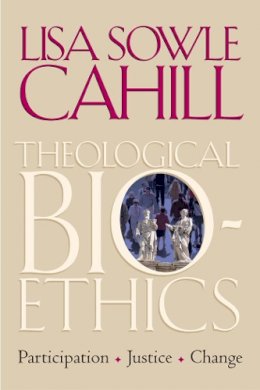
Stock image for illustration purposes only - book cover, edition or condition may vary.
Theological Bioethics
Lisa Sowle Cahill
€ 43.87
FREE Delivery in Ireland
Description for Theological Bioethics
Paperback. Such a participatory bioethics, she argues, must also take account of and take part in a global social network of mobilization for change; it must seek out those in solidarity, those involved in a common calling to create a more just social, political, and economic system. Series: Moral Traditions Series. Num Pages: 320 pages, black & white illustrations. BIC Classification: HPQ; PSAD. Category: (G) General (US: Trade). Dimension: 229 x 153 x 19. Weight in Grams: 450.
The field of bioethics was deeply influenced by religious thinkers as it emerged in the 1960s and early 1970s. Since that time, however, a seemingly neutral political liberalism has pervaded the public sphere, resulting in a deep suspicion of those bringing religious values to bear on questions of bioethics and public policy. As a theological ethicist and progressive Catholic, Lisa Sowle Cahill does not want to cede the "religious perspective" to fundamentalists and the pro-life movement, nor does she want to submit to the gospel of a political liberalism that champions individual autonomy as holy writ. In Theological Bioethics, Cahill calls for progressive religious thinkers and believers to join in the effort to reclaim the best of their traditions through jointly engaging political forces at both community and national levels. In Cahill's eyes, just access to health care must be the number one priority for this type of "participatory bioethics." She describes a new understanding of theological bioethics that must go beyond decrying injustice, beyond opposing social practices that commercialize human beings, beyond painting a vision of a more egalitarian future. Such a participatory bioethics, she argues, must also take account of and take part in a global social network of mobilization for change; it must seek out those in solidarity, those involved in a common calling to create a more just social, political, and economic system. During the past two decades Cahill has made profound contributions to theological ethics and bioethics. This is a magisterial and programmatic statement that will alter how the religiously inclined understand their role in the great bioethics debates of today and tomorrow that yearn for clear thinking and prophetic wisdom.
Product Details
Format
Paperback
Publication date
2005
Publisher
Georgetown University Press United States
Number of pages
320
Condition
New
Series
Moral Traditions Series
Number of Pages
320
Place of Publication
Washington, DC, United States
ISBN
9781589010758
SKU
V9781589010758
Shipping Time
Usually ships in 15 to 20 working days
Ref
99-2
About Lisa Sowle Cahill
Lisa Sowle Cahill is the J. Donald Monan Professor of Theology at Boston College. A former president of the Society of Christian Ethics and the Catholic Theological Society of America, she is the author of Sex, Gender, and Christian Ethics; Family: A Christian Social Perspective; 'Love Your Enemies': Discipleship, Pacifism, and Just War Theory, and other books.
Reviews for Theological Bioethics
Cahill is to be commended for seeing the critical need for theological bioethics. Her argument, in its substance and its scope, makes eminent sense. America Covers considerable ground and includes theoretical and practical positions sure to engage readers who operate from diverse disciplines and vantage points. Cahill writes with the care and clarity so characteristic of her work, offering substantive scholarship in accessible prose. The volume justly will become a standard text in graduate and seminary classrooms, and portions may be used in upper-level and undergraduate courses. Journal of Religion Offers a vision and a voice that enriches the field of bioethics and invites the reader to take specific practical steps: actions that will eventually become true democratic activism, both locally and globally. The Way A comprehensive and forceful vision of theological bioethics that goes beyond, without discrediting, traditional approaches to standard beginning and end-of-life issues that often characterize theological engagement with bioethics. American Catholic Philosophical Quarterly
